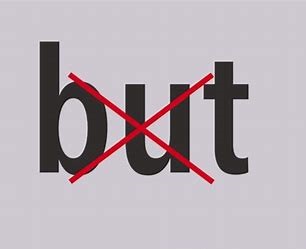Like a needle, this little word can pop the balloon of all
the good, positive things you have just said.
You are in a meeting, and you hear:
“On the whole your performance was good, but…”
“I’m sorry you feel that way, but…”
Or let’s say you’re talking with your partner or friend:
“It’s great being with you, but…”
“I like your new haircut, but…”

These words sound positive – at first. However, the word
‘but’ negates everything that came before it.
Our brains translate the word ‘but’ as ‘here’s the catch’.
And when you hear there’s a catch, you go on the defensive. Not ideal when
you’re negotiating at work or having an important discussion with someone.
The word ‘but’ acts like a mental eraser and often buries
whatever you’ve said before it,” says communications consultant Dianna Booher,
author of What More Can I Say: Why Communication Fails and What to Do About
It. “It makes communication spiral down instead of spin up.”
What to say instead
Switch it around. There is nothing wrong with using ‘but’ as
long as you are aware of how it might influence the other person’s thinking.
You can use it in a sentence, but switch around the negative and positive
statements, to emphasise the positive.
“That wasn’t your best result, but I know you will do better
next time.”
“We didn’t do so well that time, but we can learn from our
mistakes and move on.”
Swap it. During your next tough conversation, swap one three
letter word for another: ‘and’.
“Yes, I agree with a lot of what you’re saying and I’d like
to examine this particular point.”
Using ‘and’ or ‘yes, and’ adds to the conversation and
invites further discussion without negating what anyone has said. Practise
doing this for seven days and you will start to get out of the habit of using
‘but’ in the wrong place.
Words that make you sound less confident
How we speak determines who gets heard, who gets
credit, and what gets done, says Deborah Tannen, professor of linguistics at
Georgetown University in Washington, USA.

While there is no such thing as right or wrong words, some
common words can put us at a disadvantage.
- “Um”, “Ah”, “Like” and “You
Know”. When you are temporarily lost for words, it is easy to throw in a crutch
word like one of these. But they can make you seem less confident. If you feel
a crutch word on the tip of your tongue, take a brief pause instead.
- “Just”. Phrases such as “Just
wanted to ask a question”, or “Just checking in” weaken your statements, making
you seem less sure of yourself. Drop the extra word and talk like you know what
you want.
- “Actually”. This has become the
new “basically” or “literally”. It’s usually unnecessary. If you feel yourself
about to use it, leave it out.